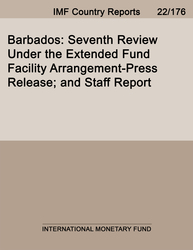
Barbados: Seventh Review Under the Extended Fund Facility Arrangement-Press Release; and Staff Report
Barbados: Seventh Review Under the Extended Fund Facility Arrangement-Press Release; and Staff Report
READ MORE...
Volume/Issue:
Volume 2022
Issue 176
Publication date: June 2022
ISBN: 9798400210464
$20.00
Add to Cart by clicking price of the language and format you'd like to purchase
Available Languages and Formats
| English |
Prices in red indicate formats that are not yet available but are forthcoming.
Topics covered in this book
This title contains information about the following subjects.
Click on a subject if you would like to see other titles with the same subjects.
Economics- Macroeconomics , Money and Monetary Policy , Public Finance , International - Economics , Natural Disasters , IMF's transparency policy , Barbados revenue authority , SOE reform , IMF's Extended Fund , tourism competitiveness , economic reform , policy issue , Fiscal stance , COVID-19 , Natural disasters , Global , Caribbean
Also of interest
Summary
Despite significant economic shocks associated with the COVID-19 pandemic, twin natural disasters, and the war in Ukraine, Barbados has made good progress in implementing its Economic Recovery and Transformation (BERT) plan to restore fiscal and debt sustainability, rebuild reserves, and increase growth. International reserves increased to US$1.5 billion at end-2021 supported by IFI loans. This, and a successful 2018-19 public debt restructuring, helped rebuild confidence in the country’s macroeconomic framework. Economic growth is projected at 11 percent for 2022 premised on a robust recovery of tourism, which is expected to return to pre-pandemic levels by 2024. The outlook nonetheless remains highly uncertain, and risks are elevated, including from higher global commodity prices following the Russian invasion of Ukraine that are feeding into inflation. Since Barbados imports the bulk of its food and energy needs, the government has adopted temporary VAT caps on oil products to contain retail price increases (fiscal cost of 0.3 percent of GDP). While fiscal accommodation was needed to respond to the pandemic and natural disasters over the past two years, the authorities are committed to running primary surpluses from FY2022/23 onwards which need to reach 5-6 percent of GDP in three years, consistent with meeting the 60 percent of GDP debt target by FY2035/36.
Copyright © 2010 - 2026
Powered by:
AIDC



